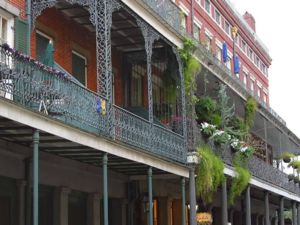New Orleans is the largest city in Louisiana. Originally part of the French and Spanish territories in America, it retains a great deal of French heritage.
Perhaps best known as the city that gave birth to Jazz and of the location of Mardi Gras, it was also in the news in August 2005 when Hurricane Katrina caused numerous failures in its levee defence system that caused widespread devastation.
According to the report from the American Society of Civil Engineers, "THE NEW ORLEANS HURRICANE PROTECTION SYSTEM: What Went Wrong and Why, A Report by the American Society of Civil Engineers Hurricane Katrina External Review Panel":As of August 2, 2006, 1,118 people were confirmed dead in Louisiana as a result of Hurricane Katrina. Another 135 people are still missing and presumed dead. Thousands of homes were destroyed. Direct damage to residential and non-residential property is estimated at $21 billion, damage to public infrastructure another $6.7 billion. Nearly half the region’s population has not yet returned after evacuating. Nearly 124 thousand jobs were lost, and the region’s economy was crippled.[1]
New Orleans was voted America's Most Dangerous City in 2008 by the Congressional Quarterly Press.

| “ |
“And then the West Africans were allowed to play their music in Congo Square. That happened nowhere else in the United States. That was the true key ingredient. The music and all the traditions and the sense of self-worth that comes with being able to have your own art form and customs and traditions, that was a part of the Afro American that lived in New Orleans.” Wynton Marsalis. |
” |
